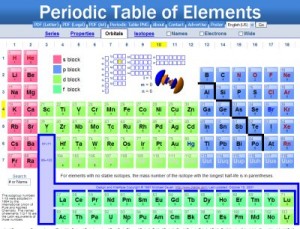Boris teaches chemistry at a high school in Canada. He’s been using the school’s Moodle server to disseminate class notes, lab sheets etc to his students. He’s found that there’s a disconnect between students’ performance in lab and their examinations, especially where the periodic table is concerned. For those of you who are NOT science people, like me, this is what the periodic table looks like.
To the uninitiated, it’s incredibly dull, yet extremely critical to many disciplines. Boris found the few students who were successful in that part of the exam had memorized the table. Good for them. The question remains, for how long after the exam did they remember the table? Were they able to use it a month later to solve a problem? Gibbs and Simpson (2005) point out that studying for exams, particularly memorizing, represents surface learning. Students pay close attention to what they think they’ll be tested on, but fail to interact with the course content in ways that will promote deep learning (p. 5).
There is no question that perhaps in every discipline, there are some things that need to be memorized. This can be facilitated by looking at the logical arrangement of the material, or using mnemonic devices. There’s another way that’s perhaps most useful because it allows students to interact with the material on a deeper level and in multiple ways, and enables them to use the material: assessments. And these come in various forms beside multiple choice questions (Jenkins, 2005, p. 69).
Boris recognizes that he needs to give students more time to review the periodic table, beyond the worksheets that he hands out to them. Students need to have timely feedback on their work if it is to benefit them. Boris could have the students do their worksheets online, and then have their peers assess and provide feedback. He could also upload case studies or problem sets for students to work on collaboratively (Jenkins, p. 72).
He could also create online quizzes that would test students’ understanding of the table. These self-assessments are relatively easy to create in Moodle, even by novices. Moodle can even be programmed to grade the quiz (except for essay questions), and provide immediate feedback to students. If students get the answer to a question wrong, Moodle will provide feedback to the student that will help him assess his thinking about the question, and push him towards the correct answer. These are particularly helpful if students can retake the quizzes multiple times.
These formative assessments are particularly useful because they are short, and focus on small segments of course materials. These types of assessments are most beneficial to learning because students can no longer develop strategies for merely passing the course, but are guided in learning all the topics. Students’ study time for the course is evenly distributed throughout the course (Gibbs and Simpson, 2005, p. 14), and this supports Chickering and Gamson’s (1987) “time on task.”
By setting up the review online, students can work at their own pace, receive timely feedback on their work while building a sense of community, and will free up class time for Boris to focus on other aspects of the discipline. It will also free up his time: he will not have to spend hours grading worksheets.
References:
Chickering, A.W. & Gamson, Z.F. (1987). Seven principles for good practice in undergraduate education. American Association for Higher Education Bulletin. Retrieved from http://www.aahea.org/bulletins/articles/sevenprinciples1987.htm.
Gibbs,G. & Simpson, C. (2005). Conditions under which assessment supports students’ learning. Learning and Teaching in Higher Education, 1(1), 3-31. Retrieved from
http:// www2.glos.ac.uk/offload/tli/lets/lathe/issue1/articles/simpson.pdf
Jenkins, M. (2005). Unfulfilled promise: Formative assessment using computer-aided assessment. Learning and Teaching in Higher Education, 1(1), 67-80. Retrieved from http://www2.glos.ac.uk/offload/tli/lets/lathe/issue1/articles/jenkins.pdf

2 replies on “Periodic Table, Anyone?”
Great advice!
Hi Debz,
Great job as usual. Setting up quizzes will work magic for him and ease the stress he is encountering. Independent learning will definitely be promoted while he can cater to other issues. Introduction of the formative procedure will also ease the stress level for students. I can be really burdensome to do a summative test for a courses with deep content. In such cases, many students just apply the rote method and are clueless to the content as soon as the test is over. I have seen quite a number of cases with our local CSEC exams.
Everton